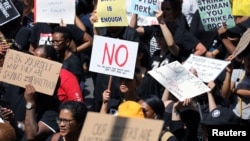President Cyril Ramaphosa says violence against girls and women is South Africa's "second pandemic." The nation has one of the world's highest rates of rape and femicide, and several recent, especially brutal killings have enraged the public. But activists say they need to see real change, not just words, from leaders, to protect victims.
Like a lot of teenagers, Thembelihle Nleya dreams big. But since she was raped earlier this year by a man in her slum-like neighborhood in Johannesburg, this 13-year-old’s dreams have turned dark.
“I want to be a sound engineer and a lawyer. Yeah, but there are times when I feel like my dreams are shattered. I just feel like my dreams are shattered. Nothing will ever be good for me again,” she said.
She’s one of countless South African girls and women who fall prey, every day, to what President Cyril Ramaphosa described as a “war” of gender-based violence.
"As a man, as a husband and as a father to daughters, I am appalled at what is no less than a war being waged against the women and the children of our country," he said.
Police murder statistics show that a woman is killed every three hours. Official statistics on sexual assault may not show the full scope of the problem, researchers say, because many victims don’t report the incident to police.
Given Sigauqwe, who works with non-profit organization Sonke Gender Justice, says patriarchy — the belief that men rule in the family and society — is the main culprit. He praised Ramaphosa for his strong words, but said that it’s the seemingly innocent ones that cause problems.
“A lot of comments that are made in the home seem quite innocuous. But there's nothing innocuous If you're operating in this system of patriarchy where to show your strength, you need to beat up someone," he said. "I'm particularly worried about the seemingly harmless behavior that we, I suppose, we promote in our homes, because that, for me, we are indirectly forming ticking time bombs.”
Seventeen-year-old Aquilline Shaku says she’s seen how words can hurt.
“Like, last week when my dad came home, I don't know what happened. So he started shouting at my mom and, like, swearing at her. So I went out and cried because I didn't think it was something that could happen to me," she said. "At first I thought that gender-based violence is about physical abuse only. But then when I realized how my mom has been emotionally abused, it broke me apart because now she's, like, part of that struggle of trying to fight to get out of that kind of relationship. But my dad doesn't allow her to go.”
Activist Thokozani Ndaba founded an organization for girls in an impoverished part of northern Johannesburg. She says that while women and girls of all backgrounds are affected by gender-based violence, she started this program here because it’s particularly lacking in resources.
“There was an 11-year old who was raped in 2018 and she gave birth to an HIV-positive child, and she was positive. And in 2018 — how is that possible? So this is how the program started. We have an after school program, where after school they can come here. Because the only thing that’s around — you saw all those men drinking at 10 in the morning — there's nothing, there's no hope. It's a dire situation. And all they know is to grab young people that they see around and rape them, and destroy their lives, because their lives are already destroyed.”
Ndaba, like many activists, is calling for harsher penalties for sexual assault. Thembelihle agrees. She recently learned — when she saw him on the street — that the man who raped her was released on bail. That provoked a tailspin of emotions.
Question: “Do you think he should go to jail for a long time?”
Answer: “Yes, I think so. Like, there are a lot of girls, there are a lot of women in this area. Why didn’t he go to some woman, instead of come to me? There are a lot of girls and women who he could have a relationship with, not to come and rape me.”
But these young women say they will not let their assailants redefine their lives, and their dreams.
EDITOR NOTES: ALL the young participants at Ntethelelo Foundation have their parents sign a blanket media waiver at the beginning of the year allowing any media interviews sanctioned by the group. We took the extra step of asking each interviewee if she was comfortable and keen on the interview. Furthermore, note that all of our in-person interviewees wore masks, as a viral precaution.




